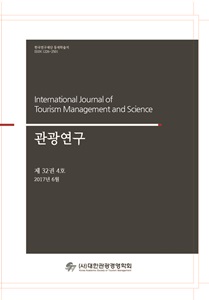본 연구의 목적은 호텔 조리종사자들이 메뉴 개발 시 조직학습역량이 개인의 혁신행동에 어떠한 영향을 미치는지를 살펴보고자 하였다. 본 조사는 특 1급과 특 2급 호텔의 조리종사자 중 메뉴개발의 경험이 있는 조리사들을 대상으로 실시하였으며 총 130개의 설문지를 분석에 활용하였다. 이에 따른 본 연구의 결과는 다음과 같다. 연구의 목적 달성을 위한 실증분석은 SPSS Win. Ver. 16.0 통계패키지를 이용하여 빈도분석, 탐색적 요인분석, 신뢰도 분석, 상관관계분석, 다중회귀분석을 실시하였다. 실증연구 분석결과는 다음과 같다. 첫째, 실험정신(B=.421, p<0.001)과 위험감수 성향(B=.227, p<0.05)이 아이디어 개발에 유의한 정(+)의 영향을 미치는 것으로 나타났다. 둘째, 위험감수 성향(B=.458, p<0.001)만이 아이디어 홍보에 유의한 정(+)의 영향을 미치는 것으로 나타났다. 셋째, 위험감수 성향(B=.355, p<0.001)과 참여적 의사결정(B=.221, p<0.05)이 아이디어 실현에 유의한 정(+)의 영향을 미치는 것으로 나타났다. 이와 같은 연구 결과를 통해 괄목할 만한 것은 위험감수 성향이 혁신행동에 가장 중요한 변수로 작용한다는 것이다.
The purpose of this study is to examine the effects of organizational learning capability on the innovative behavior of culinary employees when they developed the menus in hotel. Data were collected from 130 culinary employees who work at the delux first class or second class hotels. SPSS Win. Ver. 16.0 was used to make a frequency analysis, reliability analysis, factor analysis and multiple regression analysis. Research results can be summarized as follows. The first, experimentation(B=.421, p<0.001) and risk taking(B=.227, p<0.05) had an significantly positive effect on the idea generation. Secondly, risk taking(B=.458, p<0.001) had an significantly positive effect on the idea promotion. Finally, risk taking(B=.355, p<0.001) and participative decision making(B=.221, p<0.05) had an significantly positive effect on the idea realization. Especially, risk taking was the strongest predictor for the innovative behavior.
요약
Ⅰ. 서론
Ⅱ. 이론적 배경
Ⅲ. 연구설계 및 방법
Ⅳ. 실증분석
Ⅴ. 결론
참고문헌
Abstract
(0)
(0)
